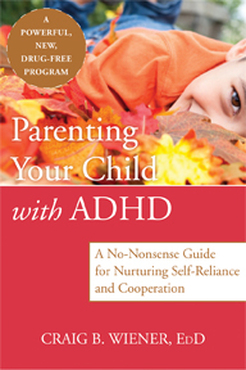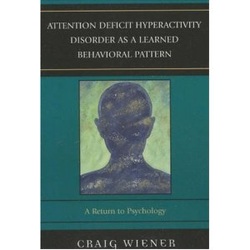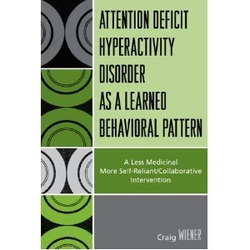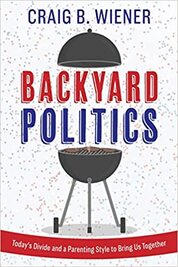Parenting Your Child with ADHD:
A No-Nonsense Guide for Nurturing Self-Reliance and Cooperation

It is now possible for concerned parents to treat their child’s attention-deficit/hyperactivity disorder (ADHD) without medication. This book shows them how. Written by a supervising psychologist who specializes in child behavioral issues, Parenting Your Child with ADHD presents a groundbreaking program for parents seeking to reduce their child’s inattention, hyperactivity, and impulsivity and strengthen his or her capacity for self-reliance and cooperation. This unique program promotes positive ways of interrelating and shows parents the five main ways they may have unwittingly reinforced ADHD symptoms in the past. Far from encouraging parents to strictly manage ADHD children, this approach promotes independence in kids so that less discipline and surveillance is necessary.
Specifically, this book helps parents promote cooperation by phrasing their requests in specific ways, reducing pressure on their child, and acknowledging the child’s preference as a way to make cooperation a more attractive choice to him or her. Parents learn to resolve problems related to messiness, inappropriate silliness and intrusiveness, chores and helping family members, coordinating schedules, sneaking and stealing, noise and yelling, and overreacting. The second part of the book moves on to issues that take place outside the home, such as shopping excursions, family outings, and travel. Finally, parents learn ways to increase their child’s independence and cooperation with schoolwork and compliance in the classroom environment. The child learns the value of being knowledgeable without the motivation of punishment or gift rewards.
Get your copy: Amazon • Barnes & Noble • Indiebound • New Harbinger Publications
Specifically, this book helps parents promote cooperation by phrasing their requests in specific ways, reducing pressure on their child, and acknowledging the child’s preference as a way to make cooperation a more attractive choice to him or her. Parents learn to resolve problems related to messiness, inappropriate silliness and intrusiveness, chores and helping family members, coordinating schedules, sneaking and stealing, noise and yelling, and overreacting. The second part of the book moves on to issues that take place outside the home, such as shopping excursions, family outings, and travel. Finally, parents learn ways to increase their child’s independence and cooperation with schoolwork and compliance in the classroom environment. The child learns the value of being knowledgeable without the motivation of punishment or gift rewards.
Get your copy: Amazon • Barnes & Noble • Indiebound • New Harbinger Publications
Academic Books

Attention Deficit Hyperactivity Disorder as a Learned Behavioral Pattern: A Return to Psychology
By Craig Wiener
February 2007 / 328 pages
0-7618-3701-9 / 978-0-7618-3701-5
Attention Deficit Hyperactivity Disorder (ADHD) has become the province of geneticists, neuropsychologists, and physicians. Coursework informs students, practitioners, and academicians about the neurobiological causes of the behaviors, and the necessity to medicate and stringently manage those who have been afflicted. While this general attitude may continue to prosper, there is increasing concern that we are proposing the existence of a medical problem when there are no biological markers or dysfunctions that reliably correspond with the behavioral criteria.
Attention Deficit Hyperactivity Disorder as a Learned Behavior Pattern: A Return to Psychology is a point-by-point analysis of the biological determinist's position and interpretation of empirical work that is now so prevalent. In that we are telling increasing numbers of children and adults that they have this genetically caused neurobiological delay, it is vital that we more closely examine that point of view.
This work familiarizes the reader with the content included in most ADHD textbooks. It brings to light the problems and contradictions evident with traditional beliefs. The reader learns to conceptualize ADHD behavior as reinforced.
The proffered challenges to biological determinism will stimulate rich discussion and counterpoint in both classroom and clinical settings, and have relevance for other diagnostic categories as well. The book proposes an alternative treatment that encourages self-reliance and cooperation to avoid the shortcomings of traditional ADHD therapies.
Get your copy: Amazon • University Press of America (ebook library) • absbooks.com
To purchase new at discount price contact Dr. Craig B. Wiener www.craigwiener.com
By Craig Wiener
February 2007 / 328 pages
0-7618-3701-9 / 978-0-7618-3701-5
Attention Deficit Hyperactivity Disorder (ADHD) has become the province of geneticists, neuropsychologists, and physicians. Coursework informs students, practitioners, and academicians about the neurobiological causes of the behaviors, and the necessity to medicate and stringently manage those who have been afflicted. While this general attitude may continue to prosper, there is increasing concern that we are proposing the existence of a medical problem when there are no biological markers or dysfunctions that reliably correspond with the behavioral criteria.
Attention Deficit Hyperactivity Disorder as a Learned Behavior Pattern: A Return to Psychology is a point-by-point analysis of the biological determinist's position and interpretation of empirical work that is now so prevalent. In that we are telling increasing numbers of children and adults that they have this genetically caused neurobiological delay, it is vital that we more closely examine that point of view.
This work familiarizes the reader with the content included in most ADHD textbooks. It brings to light the problems and contradictions evident with traditional beliefs. The reader learns to conceptualize ADHD behavior as reinforced.
The proffered challenges to biological determinism will stimulate rich discussion and counterpoint in both classroom and clinical settings, and have relevance for other diagnostic categories as well. The book proposes an alternative treatment that encourages self-reliance and cooperation to avoid the shortcomings of traditional ADHD therapies.
Get your copy: Amazon • University Press of America (ebook library) • absbooks.com
To purchase new at discount price contact Dr. Craig B. Wiener www.craigwiener.com

ADHD as a Learned Behavioral Pattern: A Less Medicinal More Self-Reliant/Collaborative Intervention
By Craig Wiener
May 2007 / 292 pages
0-7618-3809-0 / 978-0-7618-3809-8
Traditional treatments for Attention Deficit Hyperactivity Disorder (ADHD) orient to contain a neurobiological delay that renders individuals less capable of resisting shortsighted behaviors. This work critiques that understanding of ADHD, and proposes an alternative strategy to reduce the incidence of ADHD behavior.
The reader learns about the problems and shortcomings of traditional ADHD interventions and becomes familiar with the reinforcements for ADHD behavior. While most ADHD therapies employ medicine and stringency, this book emphasizes developing the child’s autonomy and cooperation. Because traditional ADHD remedies have not shown impressive long-term efficacy, the book's goal is to present a new treatment option that has a better chance of developing competency as the child grows older.
Get your copy: Amazon • Barnes & Noble • Indiebound • University Press of America (see below)
To Order from University Press of America: ADHD as a Learned Behavior Pattern can be purchased through bookstores and online retailers, or directly from University Press of America by calling, toll-free, 1-800-462-6420 or visiting www.univpress.com. All online orders through the University Press of America website receive an automatic 15% discount.
To purchase new at discount price contact Dr. Craig B. Wiener www.craigwiener.com
By Craig Wiener
May 2007 / 292 pages
0-7618-3809-0 / 978-0-7618-3809-8
Traditional treatments for Attention Deficit Hyperactivity Disorder (ADHD) orient to contain a neurobiological delay that renders individuals less capable of resisting shortsighted behaviors. This work critiques that understanding of ADHD, and proposes an alternative strategy to reduce the incidence of ADHD behavior.
The reader learns about the problems and shortcomings of traditional ADHD interventions and becomes familiar with the reinforcements for ADHD behavior. While most ADHD therapies employ medicine and stringency, this book emphasizes developing the child’s autonomy and cooperation. Because traditional ADHD remedies have not shown impressive long-term efficacy, the book's goal is to present a new treatment option that has a better chance of developing competency as the child grows older.
Get your copy: Amazon • Barnes & Noble • Indiebound • University Press of America (see below)
To Order from University Press of America: ADHD as a Learned Behavior Pattern can be purchased through bookstores and online retailers, or directly from University Press of America by calling, toll-free, 1-800-462-6420 or visiting www.univpress.com. All online orders through the University Press of America website receive an automatic 15% discount.
To purchase new at discount price contact Dr. Craig B. Wiener www.craigwiener.com
Backyard Politics: Today's Divide and a Parenting Style to Bring Us Together

Backyard Politics: Today's Divide and a Parenting Style to Bring Us Together
Education, Politics, Family Relationships
Our political system is fiercely divided. Political differences are fracturing families, separating friends, and even introducing tensions in casual encounters. Many of our elected officials, and national media, are resorting to vilification, accusation, and open hostility as a way to gain control over the political narrative.
Backyard Politics provides a way to understand the seemingly insurmountable political strife currently overtaking our country. Because each political cause believes that their approach will better humanity, it is essential that we understand both points of view to lessen animosity and reach a compromise.
For over forty years, Dr. Craig Wiener, a Clinical Psychologist, has helped individuals and families resolve their difficulties. Rather than look to politicians to diminish our political friction, he proposes a parenting solution that allows family members to resolve their problems in mutually satisfying ways. Learning how to cooperate as a family prepares children to mediate social discord when venturing into the outside world.
Backyard Politics is a must-read for those who want to foster well-being for children and society.
Releasing April 12, 2022.
Product details
Publisher : Torchflame Books (April 12, 2022)
Language : English
Paperback : 302 pages
ISBN-10 : 1611534542
ISBN-13 : 978-1611534542
Item Weight : 15.7 ounces
Dimensions : 6 x 0.68 x 9 inches
Light Messages Publishing/Torchflame Books
5216 Tahoe Drive
Durham, NC 27713 (919) 886-5498
[email protected]
Education, Politics, Family Relationships
Our political system is fiercely divided. Political differences are fracturing families, separating friends, and even introducing tensions in casual encounters. Many of our elected officials, and national media, are resorting to vilification, accusation, and open hostility as a way to gain control over the political narrative.
Backyard Politics provides a way to understand the seemingly insurmountable political strife currently overtaking our country. Because each political cause believes that their approach will better humanity, it is essential that we understand both points of view to lessen animosity and reach a compromise.
For over forty years, Dr. Craig Wiener, a Clinical Psychologist, has helped individuals and families resolve their difficulties. Rather than look to politicians to diminish our political friction, he proposes a parenting solution that allows family members to resolve their problems in mutually satisfying ways. Learning how to cooperate as a family prepares children to mediate social discord when venturing into the outside world.
Backyard Politics is a must-read for those who want to foster well-being for children and society.
Releasing April 12, 2022.
Product details
Publisher : Torchflame Books (April 12, 2022)
Language : English
Paperback : 302 pages
ISBN-10 : 1611534542
ISBN-13 : 978-1611534542
Item Weight : 15.7 ounces
Dimensions : 6 x 0.68 x 9 inches
Light Messages Publishing/Torchflame Books
5216 Tahoe Drive
Durham, NC 27713 (919) 886-5498
[email protected]
- Get your copy: Amazon • Barnes & Noble • Indiebound • Books-A-Million • Book Depository
Your browser does not support viewing this document. Click here to download the document.